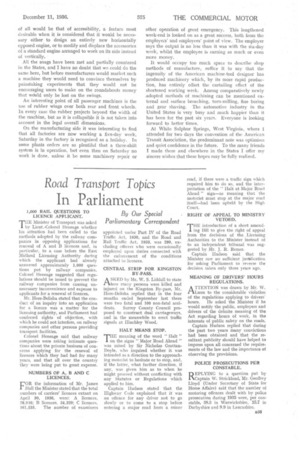Road Transport Topics
Page 53

If you've noticed an error in this article please click here to report it so we can fix it.
In Parliament
By Our Special .
Parliamentary Correspondent
1,000 RAIL QUESTIONS TO LICENCE APPLICANT.
THE Minister of Transport was asked by Lieut.-Colonel Heneage whether his attention had been called to the methods adopted by the railway companies in opposing applications for renewal of A and B licences and, in particular, to a case before the East Midland Licensing Authority during which the applicant had already answered approximately 1,000 questions put by railway companies. Colonel Heneage suggested that regulations should be issued to prevent the railway companies from causing unnecessary inconvenience and expense to applicants for a renewal of licences.
Mr. Hore-Belisha stated that the conduct of an inquiry into an application for a licence was a matter for the licensing authority, and Parliament had conferred rights of objection, with which he could not interfere, on railway companies and other persons providing transport facilities.
Colonel Heneage said that railway companies were asking intimate questions about the private business of concerns applying for the renewal of licences which they had had for many years, and that all over the country they were being put to great expense.
NUMBERS OF A, B AND C LICENCES.
FOR the information of Mr. James Hall the Minister stated that the total numbers of carriers' licences extant on April 30, 1936, were A licences, 28,916; B licences, 34,320; C licences,
161,535. The number of examiners
appointed under Part IV of the Road Traffic Act, 1930, and the Road and Rail Traffic Act, 1933, was 280, excluding officers who were occasionally employed upon duties connected with the enforcement of the conditions attached to licences.
CENTRAL STRIP FOR KINGSTON BY-PASS.
ASKED by Mr. W. S. Liddall to state how many persons were killed and injured on the Kingston By-pass, Mr. 1-lore-Belisha replied that in the four months ended September last there were two fatal and 100 non-fatal acci dents. Surrey County Council proposed to construct dual carriageways, and in the meanwhile to erect traffic signals at Hinchley Wood.
HALT MEANS STOP.
TEE meaning of the word " Halt " on the signs ".Major Road Ahead " was raised by Sir Nicholas GrattanDoyle, who inquired whether it was intended as a direction to the approaching motorist to hesitate or to stop, and, if the latter, what further direction, if any, was given him as to when he might proceed without conflicting with any Statutes or Regulations which applied to him.
Captain Hudson stated that the Highway Code explained that it was an offence for any driver not to go slowly or to come to a stop before entering a major road from a minor
road, if there were a traffic sign which required him to do so, and the interpretation of the " Halt at Major Road Ahead" sign—as Meaning that the motorist must stop at the major road itself—had been upheld by the High Court.
RIGHT OF APPEAL TO MINISTRY VETOED.
PTHE introduction of a short amend
ing Bill to give the right of appeal from the decisions of the Licensing Authorities to the Minister instead of to an independent tribunal was suggested by Mr. J. R. Reiner.
Captain IIudson said that the Minister saw no sufficient justiacation for asking Parliament to reverse the decision taken only three years ago.
MEANING OF DRIVERS' HOURS REGULATIONS.
ATTENTION was drawn by Mr. W. Lunn to the considerable violation of the regulations applying to drivers' hours. He asked the Minister if he would notify the public, employers and drivers of the definite meaning of the Act regarding hours of work, in the interests of public safety on the roads,
Captain Hudson replied that during the past two years many convictions had been obtained and that the resultant publicity should have helped to impress upon all concerned the requirements of the law and the importance of observing the provisions.
POLICE PROSECUTIONS PER CONSTABLE.
D EPLYING to a question put by l‘Captain W. Strickland, Mr. Geoffrey Lloyd (Under Secretary of State for Home Affairs) said that the number of motoring offences dealt with by police prosecution during 1935 were, per constable, 38.3 in Warwickshire, 15.7 in Darbyshire and 9.9 in Lancashire.




































































































